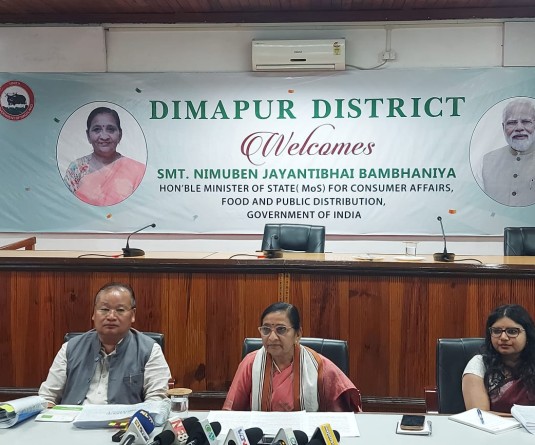T. Keditsu (3rd from R) seen with her father, Dr. Kezevituo Keditsu (M) for whom her newly released book "The Boy Who Loved Food" was dedicated to, Colo Mero, Social Entrepreneur (3rd from L), Publisher, Vishü Rita Krocha (2nd from L), Adenuo Shirat Luikham (L), Sharon Longchari (2nd from R) and Visato Yhoshü (R)

‘The Boy Who Loved Food’ by T Keditsu released
Morung Express News
Kohima | October 13
“As a child, I would sit beside my father, listening to his stories—memories stirring with flavours and aromas, told in the language of meals. His love for food was something I absorbed both through his tales and the way food was central to our family’s life.”
These are thoughts shared by T. Keditsu, feminist poet, academic, writer and educator during the launch of her fourth book, “The Boy Who Loved Food”, a portrait of her father’s life and a reflection on the bond that has tied the father and daughter together through their mutual love for food.
The book, which marks the 98th publication of PenThrill was formally released by Colo Mero, Social Entrepreneur at the Rivenburg Memorial Chapel Hall, Baptist College Kohima on the occasion of her father’s birthday as he turned 72 on October 12.
Speaking on the occasion, she recalled that, “my father grew up during a time when, to use a gynaecological metaphor in his honour, our society was in the labour pains of birth into modernity, beset with one tempest after another of conflict and upheaval.”
Food, she asserted “for many in his generation, was a means of creating moments of joy and comfort in an otherwise hard existence” while underscoring that, “we must not forget that for many Nagas, our famed love for food is about reclaiming something essential, asserting our survival, and creating a sense of abundance in the midst of lack.”
Expressing that as she grew older, she began to understand that food, for her father, was a language all its own, she stated that, “it expressed what words often could not: love, care, and a sense of belonging.” This realization, she added, helped her to see how food became central to their relationship. “Where I found pleasure in taste and experience, my father found solace in the simple act of sharing a meal, of feeding the ones he loved. Food was his way of showing love, of building family”, she put across.
“The Boy Who Loved Food”, she further expressed, is her way of preserving that connection and that, in writing the book, she said, “I’ve come to realize that food is complex, nuanced, and deeply intertwined with who we are. It is about survival, love and yes, memory.”
‘Food is a language of love that spans generations’
Addressing the launch, Colo Mero, Social Entrepreneur noted that T. Keditsu “brings us a heartwarming story that is sure to capture hearts.” Highlighting that the book tells the story of a boy and his daughter, bound by their shared love for food, he stated that, “in just a brief 12-minute read, Keditsu invites us into a world of warmth, connection, and joy, reminding us that food is more than sustenance—it’s a language of love that spans generations.”
Asserting that “The Boy Who Loved Food” is not just a book to be read, but to be felt, he further commented that “it celebrates the richness of simple pleasures and the bond between family, which, like a good meal, nourishes the soul.”
Further describing T. Keditsu’s father whom he calls ‘Uncle Keditsu’ as one of his best elder friends, and a father figure, he said that “Uncle Keditsu is known for his gentleness, kindness, grace, compassion, friendliness and his outstanding philanthropic works.”
He also acknowledged the Publisher of PenThrill Publication House, by saying, “you are doing a wonderful job not only in keeping alive the culture of reading and writing, but in preserving this fast-dying art.” “Her simplicity, humility, and creativity shine through her graceful writings, bringing the uniqueness of day-to-day life into vivid focus. Through PenThrill, she is now empowering both aspiring and established writers to fulfill their dreams”, he added.
Children’s literature needs support
In her review of the book, Adenuo Shirat Luikham, Assistant Professor, Don Bosco College Kohima, noted that the themes that emerge from the story are universal while pointing to themes such as “the enjoyment and pleasure of partaking in food, familial bonds, loss and grief, hardships, and reconciliations”.
She remarked that there is also something profound that surfaces from this preoccupation with food while articulating that, “in many Naga homes and families, affection is not vocalised or overtly shown, but it is communicated through food.” In this regard, she said, “the reader gets to see that food becomes the bridge through which emotions and feelings are communicated.”
Further on the relevance of the book, she underscored that “the book addresses issues that children face while growing up” and asserted that “the burgeoning of children’s literature in Nagaland is something to be supported and encouraged.”
In her publisher’s note, Vishü Rita Krocha said that, “as years unfold, even the most cherished memories naturally fade.” However, she noted that “the stories we share about our loved ones, especially in the form of writing, have the power to preserve these memories and breathe life into the past.”
She also maintained that “it allows future generations to glimpse at a past life and forge connection and a new understanding that may include values, beliefs and experiences of a life that the future generations can definitely learn from.”
Stating that “The Boy Who Loved Food” offers much insight into the social landscape of the Naga life, she also highlighted that “the entire story is further enhanced by the wonderful and meticulous illustrations of Akanito Assumi.”
Highlights of the event included invocation by Visato Yhoshü, Pastor, Union Baptist Church Kohima while Sharon Longchari, D.C (Hq) Commissioner’s Office, chaired the programme.





